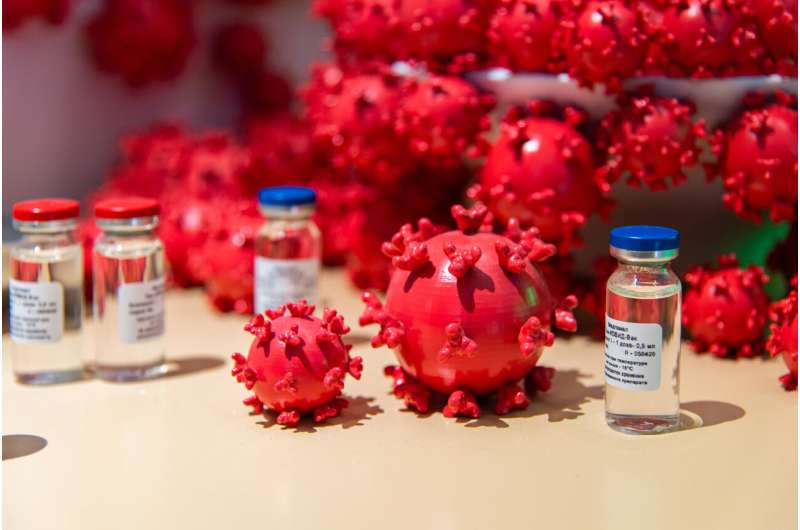Omicron: Vaccines remain the best defense against this COVID-19 variant and others

We have made it through another pandemic winter holiday. Fortunately, COVID-19 fatalities have decreased since the year before, however, the numbers still weren’t ideal. Using Dec. 25 as a reference date, the death rate from COVID-19 in the United States was 4.27 per million in 2021, compared to 7.48 per million in 2020. In Canada, it was 0.42 per million in 2021, compared to 2.95 per million the previous year—a much more significant decrease.
The difference that vaccination is making becomes clear when comparing the corresponding rates of fully vaccinated people: 61.4 percent in the U.S. compared to 77.1 percent in Canada. The higher vaccination rate in Canada corresponds to the more sharply reduced death rate.
As a medical doctor and researcher of COVID-19, I am optimistic about the power of increased vaccination rates in combination with infection prevention practices to fight the pandemic.
Waiting for natural herd immunity will not fix this or save lives. In the U.S., the 55 million people who have tested positive for COVID-19 since the pandemic began represent only about 17 percent of the roughly 330 million population—nowhere near the level needed for herd immunity. The only ethical means of achieving herd immunity is vaccination.
Omicron
Unfortunately, the Omicron variant may have greater potential to infect people than past variants, and may be more able to infect fully vaccinated and boosted individuals, according to research awaiting peer review. This new form of the virus is a product of its natural evolution. The longer a pandemic lasts, the more changes occur with a virus.
The best way to stop new variants from arising is to increase the proportion of vaccinated individuals while maintaining infection prevention measures, like following recommendations for face masks and social distancing. Vaccinated individuals are less likely to pass on the virus if they do become infected.
Most cases and deaths continue to affect unvaccinated individuals. Further sickness and death are largely preventable, just as most of the illness and death in recent months were. Vaccine refusal, in the absence of valid medical reasons, and not adhering to infection prevention measures are largely responsible for the continued hardship of the pandemic.
Vaccines and variants
Vaccines remain an effective tool towards ending the pandemic, particularly against Omicron. This is despite research awaiting peer review indicating the new variant may have greater potential to infect people than past variants, and may be more able to infect fully vaccinated and boosted individuals.
More data is needed to establish how much more or less infectious the Omicron variant is compared to others, but Omicron’s ability to infect vaccinated individuals (albeit less so than unvaccinated individuals) is concerning. That means infection prevention activities, like wearing a mask and social distancing regardless of vaccination status, are still essential. Poor adherence to these measures can be enough to increase cases in a community, even with many vaccinated folks.
While vaccines are less protective against becoming infected with Omicron than other variants, they offer significant protection against developing an infection and severe illness.
For those who have already had COVID-19 but have not been vaccinated, the evidence available so far suggests that they should still get vaccinated because past infection did not protect against Omicron. While there are claims that Omicron produces milder illness, one cannot rely on this when infected individuals still face a significant chance of severe disease.
Several months of winter remain, and COVID-19 cases are ballooning again. There is reason to believe that the pandemic will get worse before it gets better.
Pandemic toolkit
Booster shots are readily available in the U.S. and are increasingly available in Canada. Boosters have been shown to confer increased protection against the Omicron variant.
It is everyone’s social responsibility to get the booster, with the exception of the very few people who are allergic to vaccine components. Research showed that being highly allergic to something that is not vaccine-related rarely equates with an expected severe allergic reaction to the vaccine.
I have an allergy to shellfish that has placed me in the hospital when I inadvertently consumed it. Nothing happened to me when receiving any of my three shots of COVID-19 vaccines, and the above research suggests that this would be the case for most people with non-vaccine allergies.
The risks of COVID-19 far outweigh the very small risk of having an allergic reaction to the vaccine. In the unlikely event that you did have an allergic reaction to the vaccine, such reactions are typically mild and readily treated.
The pandemic will get better if we work together. While news of Omicron and implications on vaccine effectiveness are disheartening, more systems are in place to respond to this change and future changes in the pandemic. Pfizer, one of the drug makers of the effective COVID-19 vaccines, has already announced a readiness to produce vaccines adapted to the changing virus. We can expect other manufacturers to follow suit, ensuring that the therapies needed to meet this challenge are available.
Source: Read Full Article


